“Let others praise ancient times; I am glad I was born in these.”
Ovid
“The funny thing is, you can learn policy. You can’t learn loyalty.”
First, open this, and flip through it in your free time later:
https://www.project2025.org/policy/
The attached “Mandate for Leadership” policy-book runs over nine-hundred pages, with detailed agency-by-agency executive branch reforms. You, yes you, can apply for lectures and training there too. A happy few shilled it for the longest time on Twitter, and now Project 2025 is finally getting some play from both the corporate press and their unknowing left-wing-twitter pawns2.
You’d think that these suburban anarchists would be open to decapitating an American deep-state we now know to have obstructed the designs of peacenik presidents.

But moments like these really reveal their priorities.
Any bipartisan alliance against America’s free-trade and forever wars consensus will always break on the shoals of the social issues dividing her populace.
Both sides’ respective moral matrices will prevent a red-brown, populist popular front from ever coming into being. The leftie reticence to engage optimistically with the promise of Project 2025 proves this.
The idea suggested that the Insurrection Act is “dictatorial” is laughable, looking at the precedence for its invocation:
President Bush, who for all of his faults was an actual American sovereign, last invoked it against rioters in L.A.
It is doubly hilarious coming from a political party that has spent the last three years imprisoning thousands and barring candidates from the ballot in response to a sham-“insurrection” with zero fatalities.
Project 2025 is really just a hiring drive coordinated across the big right-wing think tanks, preparing early for the staffing of any future GOP administrations. Learning from the wasted years of Trump’s first term, this time they’re going in with a legal and organizational game-plan to concentrate power in the President’s person, as opposed to the agencies run by his unelected enemies.
Here’s Heritage-Foundation man Russell Vought:
“The modern conservative President’s task is to limit, control, and direct the executive branch on behalf of the American people.”
The President’s preeminent power is the power of appointment, to discipline the delegates tasked with fulfilling his executive orders.3
“It is the President’s agenda that should matter to the departments and agencies that operate under his constitutional authority and that, as a general matter, it is the President’s chosen advisers who have the best sense of the President’s aims and intentions, both with respect to the policies he intends to enact and with respect to the interests that must be secured to govern successfully on behalf of the American people.”4
This isn’t really dictatorial at all. Project 2025 is a move for greater democratization.
Contra my elite-theorist friends, rhetorical majoritarianism remains a good frame for right-wingers.
Liberalism was undemocratically foisted on Americans by judicial/administrative diktats through the 1960s. Illiterate attacks on the “tyrannical” Supreme Court give away the game — all SCOTUS is doing in cases like Dobbs is giving away its own power to regulate abortion to state legislatures.
Moldbug has poked fun at this elitist contradiction in the liberal mind before:
“Say the word democracy. Notice how good it sounds. Everything democratic is good. A democratic meeting, a democratic policy, a democratic giraffe… if the adjective fits the noun at all, anything you paint with it comes out shiny and bright.
Now say the word politics. Notice how bad it sounds. This person is a politician. She’s being so political. These dangerous proposals would politicize US foreign policy. Every use of the word is negative. Everything you paint with it comes out sordid and mean.
But… what is democracy without politics? Is there any such thing? If there is, doesn’t it sound like something North Korea would come up with? Our higher form of democracy has transcended mere politics. Uh huh. Sure. I know where you’re going with that.
As objective realities—structures of governance—aren’t democracy and politics in fact… synonyms? But if they’re the same word, how can they have opposite connotations? How can it be that everyone knows, obviously, of course, democracy is a good thing, but politics is a bad thing?”5
Per the Hamiltonian design of the federal Constitution, the Executive represents the entire NATION, set against the petty sectional interests assembled in the Congress. On behalf of the nation’s concrete interests, the executive must reign in the unelected administrative state.
“Far from being merit-based, this workforce contains the worst of both worlds: a small left-wing expert class at the top (the deep state) and masses of unproductive, nonessential, unionized employees beneath them (what might be called the DMV state, after those who staff state motor-vehicle offices).”
The President is meant to be checked by Congress and the Courts, and not his own staff. The Founders “expressly decided against having any check on the president's power within the executive by rejecting proposals for an executive branch council.”
Project 2025’s enemies offer no rebuttal but the “celebration parallax.”
Reardon defends {the bureaucrats} by making contradictory arguments: First, he insists that claims of bureaucrats thwarting the will of the president are unfounded. Second, he maintains that unelected bureaucrats are a necessary check on presidential power.”
Clowns to the Left of Me, Jokers to the Right:
A Short History of the Deep State:
References to a “deep state” as a concept in political science or folklore can be traced back to either Atatürk’s Turkey or Ernst Fraenkel’s characterization of the Nazi regime as a “dual-state,” for its liberal declaration of states of emergency and exception. But we don’t have time for a full-hearted conceptual history.
In America, the “deep state” is just all of the unelected government officials who outlast those who nominate them to their positions. Project 2025 targets America’s overgrown civil service, the progressive replacement for the spoils system. This caste of mandarins quickly mutated from a cadre of impersonal administrators into the byzantine enclave of insubordinate traitors we know today.
“Under the original {Pendleton} act, just 10% of the bureaucracy was given civil service protections. Today, of the 2 million full-time federal employees, all but 4,000 enjoy some form of civil service protection. That means 99.8% of federal employees cannot be fired by their boss, the commander in chief…”6
Franklin Roosevelt worsened this situation. His New Deal:
“…produced a policymaking system with multiple, overlapping programs, paid for and administered by different levels of government and nongovernmental organizations. Responsibility for policy outcomes was hard to affix in this complex system, making mass mobilization difficult and diverting participation into particularistic, piecemeal forms. The diffuse character of government meant that coordination and control of the policymaking system were produced by networks that cut across agencies, levels of government, and the state-society divide, rather than by political parties.”7
The Conservative Legal Movement was created to decapitate these networks. More on them later. Let’s first look at how small Communist cadres were able to scale this cursed cursus honorum throughout World War 2.
“Aiding the{ir} infiltration process were the pell-mell methods of the First New Deal under President Franklin Roosevelt... Subsidies, regulations, and new programs abounded. This hurly-burly meant a lot of federal hiring. It also drew into its vortex all manner of self-styled planners and reformers anxious to get in on the action. And nobody at this time was bothering to vet the new recruits for anti-Red credentials…
As a result of these conditions, a sizable corps of Communists and fellow travelers would wind up on the federal payroll, together with a host of others susceptible to recruitment.”
Inspired by their messianic faith in Marx’s program (and occasional missives from the Kremlin), these Communist fronts ran circles around their clueless liberal colleagues all the way to Yalta. Whittaker Chambers later mapped out these nodes of Red power for the American public:
“A particular concentration point for CP members was the Agricultural Adjustment Administration, a New Deal offshoot of the Department of Agriculture. Here the main Communist leader was one Harold Ware… an enthusiast for Soviet-style collective farming. The group he headed, according to Chambers, included such eventually well-known figures as Alger Hiss, Henry Collins, Nathan Witt, John Abt, Lee Pressman, and Charles Kramer, among a considerable host of others.
Subsequently, Witt and Kramer would move to the National Labor Relations Board, which became a redoubt of Communist economic/political power later in the decade. Hiss, Collins, and Abt would meanwhile get jobs with congressional committees, and Hiss—the most upwardly mobile of the group—would move to the Department of Justice and then to the State Department. Though State wasn’t then the penetration target it would become a few years later, there were already comrades ensconced there in the 1930s. Noel Field, Richard Post, and Julian Wadleigh were among those in the department named by Chambers as members of the apparatus.
A further enclave of CP members and fellow travelers—probably the largest group of all—was in the Treasury Department. Here were employed the influential Harry Dexter White, the Soviet agent Solomon Adler, V. Frank Coe, and several others named by Chambers, all also named by Elizabeth Bentley and in the pages of Venona. Added to these were still other party contacts holding federal office: Irving Kaplan of the National Research Project of the Works Progress Administration (WPA), Victor Perlo at the National Recovery Administration (NRA), Hiss’s brother Donald in the Department of Labor, and White House assistant Lauchlin Currie. Small wonder Soviet espionage boss J. Peters would brag to Chambers: “Even in Germany, under the Weimar Republic, the party did not have what we have here.”
In explaining how such infiltration happened, Chambers would cite his own experience when, in 1937, he wanted to get a federal job and establish an official identity for the record after leading a mostly underground existence. He said he was referred to Irving Kaplan at the National Research Project and in a matter of days would be on the federal payroll. The research project, per Chambers, was a kind of “trapdoor” through which comrades could enter governmental ranks, then move on to other outposts. (And when one got in, he could hire others.)”8
A mild counteroffensive we now know as the “Red Scare,” led by heroes like Nixon and Chambers, failed to roll back the innovations of the 20th century. The cadres had achieved their mission. The Revolution was.
“There are those who still think they are holding the pass against a revolution that may be coming up the road. But they are gazing in the wrong direction. The revolution is behind them. It went by in the Night of Depression, singing songs to freedom.
There are those who have never ceased to say very earnestly, “Something is going to happen to the American form of government if we don't watch out.” These were the innocent disarmers. Their trust was in words. They had forgotten their Aristotle. More than 2,000 years ago he wrote of what can happen within the form, when “one thing takes the place of another, so that the ancient laws will remain, while the power will be in the hands of those who have brought about revolution in the state.””9
The Red Decade, as Lyons called it, remains murky and misrepresented in the public mind. We will revisit it — and the McCarthy scandal — in another post. It is the legend of the fall of “the American system of government… an intricate machine devised by the smartest and most energetic group of men in history, all of whom disappeared by around 1945. Their creation passed on to Irish political machines, clandestine NKVD cells, and Zionist activists.”10
Above all, the era provides crucial lessons explaining not only how we got here, but also how one can game the federal government.
Recent years have already borne witness to American nationalists succeeding at entryist games.
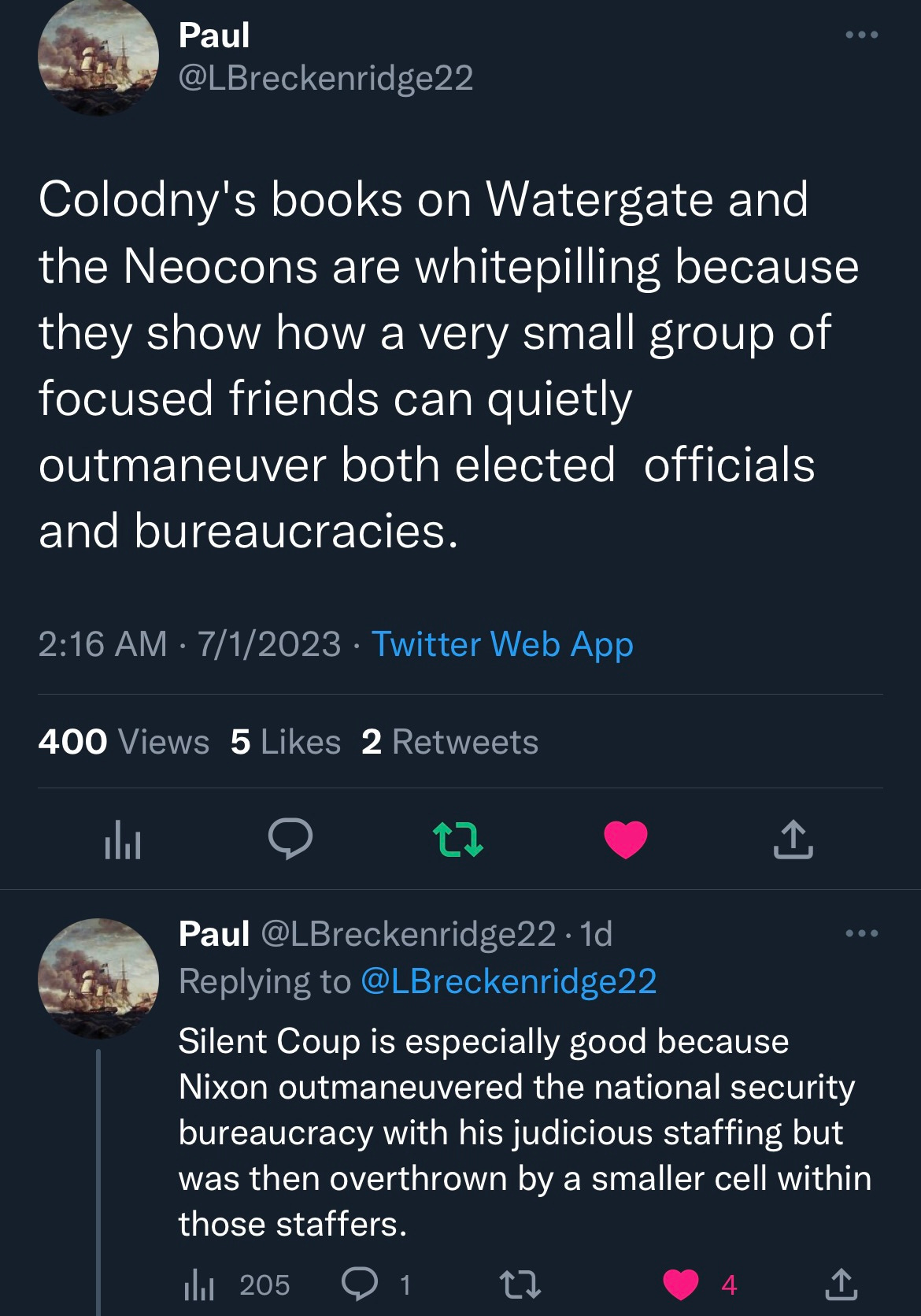
Genuine Trumpists, filtered out by the Republican apparatchiks running the big man’s transition team, snuck into the administration through Ben Carson’s Department of Housing and Urban Development. The globalist career bureaucrats across both parties can be outmaneuvered by you and your friends, so long as you act judiciously.
But back to the Conservative Legal Movement!
We’ve gone over the importance of civic collectives in older articles. From these institutions, a counter-elite can be cultivated to displace old bureaucracies. In the words of Vilfredo Pareto:
“History is the graveyard of aristocracies.”
Processes of Parallel Radicalization:
Throughout Reagan’s tenure, the world’s first conservative administration, America’s appetite for tax cuts and getting tough with the Soviets was easy to translate into policy. But rolling back the “rights revolution” of the 1960s called for a right-wing “elite mobilization.”
“In the law, conservatives faced liberal opponents with a much more impressive set of resources: elite law schools, a large chunk of the organized bar, a vast network of public interest lawyers, and the still-powerful liberal understanding of rights…
If they were to have any chance of influencing the development of the law, conservatives would have to compete directly with liberals at the level of organizational, and not simply electoral, mobilization.”
The story of the Sixth Party System was Nixon’s realignment, an outreach program aimed at downscale whites, which Donald Trump completed.
“Conservatives were well on their way to capturing the Republican Party and turning it into a powerful, movement-based vote-getting machine, capable of prevailing in mobilization heavy contests like the battle over the Equal Rights Amendment. Grassroots liberalism, by contrast, was shrinking, while its forces at the elite level—in the professions, universities, the media, and Washington-based public interest organizations—were surging.”
Businessmen, farmers, southerners, anti-busing northern ethnics and religious conservatives united against the sixties’ “Rights-Revolution,” defended by a vanguard of activist judges raised from the “liberal legal network.”
“Even as the Democratic Party’s electoral power waned in the late 1960s, its strength in these policy networks waxed. These networks, built largely through subsidy by third-party funders such as charitable foundations, facilitated policy change by encouraging courts, congressional subcommittees, and bureaucrats to collaborate in a process of low-visibility, incremental policy expansion. These changes in the structure of the policymaking process made elections decreasingly important as sources of large-scale policy change. The flip side of this institutional transformation was a political system increasingly sensitive to expert opinion, issue framing, and professional networks. Many of liberalism’s achievements derived from the skillful use of power by a transformed federal bureaucracy, staffed by actors sympathetic to (or previously involved in) social movements. This system’s advent gave liberal Democrats the ability to push their policy agenda even when the presidency was in the hands of Republicans…
…Social movements and interest groups that had been organized in opposition to political parties eventually became institutionalized, cemented to the state, and coordinated in a network increasingly connected to the Democratic Party. This activist network, primarily concerned with policy rather than electoral outcomes, became the dominant faction in the Democratic Party. The rise of this faction led to George McGovern’s nomination in 1972, as the head of a strange new coalition unlike any the Democrats had ever seen.”
1972 witnessed the largest Republican landslide in history, but the following decade generally advanced McGovern’s program of “acid, amnesty and abortion.” This was the subject of Pat Buchanan’s first book: Conservative Votes, Liberal Victories.
Nixon and Reagan first attempted to defund leftist organizations, but eventually conservatives realized that they had to cultivate their own elites to personally occupy the nation’s courts, classrooms and cabinet positions.11
Preparing this government-in-waiting is the first component of Project 2025, coordinating the work of those conservative think-tanks invented to meet the challenge of “elite mobilization” back in the 1970s.
V. O. Key, perhaps the greatest American political scientist of his generation, recognized that modern political strategies at scale rely on the coordinated radicalization and activation of the party’s masses, operators and office-holders.12
Since its inception in America, pure Populism has proven to be a posture for losers.
William Jennings Bryan’s Democratic Party was a sectional minority that did not get much of what it wanted. Taking his Southern and Western base of support in the realignments of the 1960s, the Republican Party has adopted the insurgent psychology of both sections.
Where the early Alt-Right appealed to young professionals, and European nationalist parties do the same, America’s New Right attracts the weird and middle-aged, filtering politics through their personal frustrations.
We needed grunts. We have more than enough now. What comes next is the cultivation and employment of professionally credentialed elites to steer their righteous anger in a productive direction.
The challenge for the Dissident Right now is to affect a process of “parallel radicalization.” We need a mass strategy and an elite strategy.
Ideally, right-wingers across the west will come to our talking points at the same pace. I want to see voters increasingly backing reactionary candidates in primaries. At the same time, we will propagandize our way to the same ideological hegemony over right-wing parties and their elites enjoyed by Movement Conservatives from the late Cold-War to today.
This is why Trump’s cult of personality is still useful.
There were liberal Republicans once! They are now an endangered species, and if all goes to plan, the globalists shall be launched into the dustbin of history alongside them.
Trump and his endorsees’ domination of party primaries shows that the “radicalization” of the mass is complete in America. The same goes for Marine Le Pen’s efforts in France, her National Front replacing the center-right Republicans as the patriotic alternative to Macron’s centrist government. The Anglosphere might need to catch up, but the radicalization of the mass has been hugely successful in both nations.
What’s left is continuing to cultivate the counter-elite. Across the world. Who will be our jet-setting answer to James Carville? Steve Bannon? Or someone more radical?13
And anyone plugged into right-wing Twitter can tell that there has been a lot of progress on that front too. Anything good out of any conservative magazine in the last decade was probably scalped from an anon.14
One lingering issue is “containment.” Right-wing elites co-opting our rhetoric to win elections, before failing to deliver on any of the big issues.
Project 2025 is “technically available to any future conservative nominee,” from Trump to DeSantis to Haley “— and even the independent campaign of Robert Kennedy Jr.”15 It is just an alliance of the think-tanks, some having improved since 2016, while others just repackage the same old conservative garbage.
This is inevitable, as “Conservatism” continues to snowball into a globally organized movement.16

As fiercely as Alt-Right types inveigh against the Judaization of America, so too do Haaretz journalists lay into the Americanization of the Israeli right.17 Politics as an elite knife-fight over legal hermeneutics is only natural, a juristic firmament flowing out of Anglo-Judaic modernity.18
And it is a motif as everlasting as it is dull and inaccurate, for Australian left-wingers to cry havoc over those dirty seppos infecting our pristine social-democracy with their fanatical, libertarian, self-righteousness.19
But these are problems for you to deal with once you get involved.20 Refusing to participate is consenting to be ruled by your hostile inferiors.
For now, I’ll focus on how Trump was actually setting our project in motion, while we were all distracted by his election contests.
From College Football to Schedule F:
“I underlined my closing warning to Nixon: “If we do not see and recognize and act upon this as really the first reality — then we are going to be like that same French king of whom it was said, ‘He would have made a great king, but he inherited a revolution.”
Pat Buchanan, Nixon’s White House Wars, a transparent allegory for the Trump years.
Too many on what remains of the Alt-Right still have this image of the former president. He was bad and stupid all along, because of muh Kushner. Or something.
But Trump’s downfall from the peaks of 2016-rhetoric was a more gradual process. The story of the Trump campaign’s corruption is the story of its evolution from a conspiracy of 8 staffers on the fifth floor of Trump Tower, picking cities for the boss to fly to and rant at, to the multimillion-dollar stage show of 2020. With victory came an influx of wealth and attention, and all of the GOP’s stale Reaganite bromides.
Once Trump secured the nomination in 2016, the Republican Establishment entered the building, and like Faust he accepted their national infrastructure to do battle against the Clinton Machine.
The RNC banished most of his loyalists, exiled to the solemn duty of planning the inauguration ball. Mike Pence ran the transition team. The people running the show didn’t even think Trump would win. No wonder they didn’t show up with a rolodex of nationalist hires. Bush-era careerists, enjoying preexisting relationships with the federal government’s most obscure offices, took over. Their agency action plans set the tone for the next 4 years: the GOP on autopilot.
I’ll also note that GOP autopilot is, although far from what we want, a marked improvement over the rest of politics post-FDR. The idea that Trump was a disappointment on any front is a foreign concept to your average conservative. That is why he is winning the nomination today. If he wins the national election next year, it will be because Americans remember this regime fondly.
That all being said, the idea that GOP orthodoxy was all Americans got from Trump needs to be nipped in the bud. As one anonymous poster put it:
“The charge that Trump “demonstrated no interest” in controlling the government through well-chosen subordinates is ludicrous to anyone who paid attention to his personnel decisions from November 2020 to January 2021. In November 2020 Trump appointed a small group of energetic and radical mostly younger staffers to key positions in the Defense Department and the White House, distinguished solely by their demonstrated loyalty to Trump and their hostility towards ‘the Washington establishment,’ if you will. Trump made an obscure Green Beret colonel the Secretary of Defense, and for his senior advisors appointed Kash Patel, Ezra Cohen-Watnick, and Douglas Macgregor. I won’t recap their resumes for you, but these men were clearly radical picks, certainly ones that only make sense if your interest is no longer in appeasing certain factions, or appearing acceptable, but only seizing control of the Pentagon to advance your own agenda. Сohen-Watnick in particular went from being senior civilian in charge of “special operations and low-intensity conflict” to senior civilian in charge of “defense intelligence.” Douglas Macgregor is probably the most openly “our guy” of any senior national security figure. I don’t think anyone wanted him working in the Pentagon aside from Tucker Carlson and anonymous twitter accounts.”
At Unreconstructed, we remember that sequence of events.
Meet John McEntee.
After a brush with viral superstardom, McEntee dropped athletics for politics, and planned rallies in the early days of the Trump campaign.
In the words of the anon who pointed him out to me:
“He quit his job to volunteer for the campaign at a time when Trump was supported by no one aside from anonymous internet racists.”
Though he was drummed out of the White House for a gambling problem, McEntee made his way back in by January 2020. Reeling from the colossal waste of time that was his First Impeachment, Trump trained his sights on many enemies in the administrative state now unmasking themselves.
Trump-watchers will notice a shift in his rhetoric from 2016 to now. Before he attacked America’s establishment and bureaucracy as stupid, and claimed that he could win them over with an intelligent deal. His entire first term was characterized by these attempts to win by compromise. Nowadays, he calls them sick, evil people.
McEntee, a day-one loyalist, was called out of the wilderness and put in charge of the Office of Presidential Personnel. This gave him the power to hire, promote and reassign the President’s four-thousand political appointees. These 4000 oversee two million government employees, as well as around 18 million contractors.
McEntee introduced political loyalty tests, asking bureaucrats what they agreed with of Trump’s 2016 platform, and how they planned to implement it. These will return in 2025.21
The deputies of this “deputy president,” as some called him?
“McEntee’s Presidential Personnel Office had about thirty employees, many of them in their twenties and at least a couple without college degrees.”
“In both attitude and mission, they were a Trumpian version of the Red Guard youth of Mao’s Cultural Revolution in the late 1960s who rooted out intellectuals and “class enemies” in the upper ranks of Chinese society. There also seemed to be another requirement: One senior White House official told me McEntee had hired “the most beautiful twenty-year-old girls you could find, and guys who would be absolutely no threat to Johnny in going after those girls.” Some inside the White House called McEntee’s staff “the Rockettes and the Dungeons and Dragons Group.” And in fact, one of McEntee’s assistants had performed with the Radio City Rockettes.”22
Ah yes… a youthful meritocracy holding a knife to the throat of America’s imperial gerontocracy!
“McEntee was there—bossing around Cabinet secretaries, decapitating the civilian leadership at the Pentagon, and forcing officials high and low to state their allegiance to Trump.”23
Dubbed “the Donald Youth” by one assmad publication, these virile condottiere bossed around D.C’s worst.
The source for the rest of this section, James Bacon, was literally a college kid taking night classes while he learned how to gut the government.
Let’s look at what the kids did to people decades their senior.
Around 2019-20 they purged John Rood and Dan Coats, avoiding another Russia scandal. These young guns canned Mark Esper for Christopher Miller. Notably, Miller singled out Mexican narcotics as America’s greatest national security threat, and downplayed the putative Chinese threat as a cash-cow for the Military-Industrial-Complex.
As part of a global troop drawdown executed by Miller, Trump withdrew troops from Somalia.24 Biden has since returned American soldiers to that shithole country.25
“Per the President’s directive, I gave the order to withdraw all American troops from Somalia by January 15, 2020, five days before the end of the Trump administration. Combined with our work to reduce American forces in Afghanistan to 2,500—the smallest military presence since the war began in 2001—I had done all I could to fulfill the President’s promise and to end my generation’s wars with honor.”26
Chris Miller’s senior advisor? Douglas MacGregor!
I don’t care about his Ukraine prediction record. He’s our guy.
Sure, people were disappointed over the riots. Trump’s heart was in the right place, but the entire military establishment threatening to coup his government kind of tied his hands there. Aside from that, Trump’s final years were some of his most productive. The wall was underway at last. During COVID, Americans got Title 42 and a general shutdown on immigration, proving it can be done.
Most importantly, Trump’s team developed an understanding of the tools at their disposal. For example, the Office of Personnel Management governs every federal employee’s pay, promotion requirements, healthcare and pension benefits.
It can initiate “reduction in force” exercises, firing thousands at a time. The last major attempt at this was under Reagan, before he was stonewalled by a Democratic senate.
“As a Washington Post feature on {Donald Devine} said, he “has overseen the RIFing of thousands of federal workers {100,000+}, cut salaries and expense accounts by 8 percent, reduced disability retirements by 40 percent, eliminated abortion coverage from federal health insurance programs, and threatened the automatic merit pay system… [plus] the sacred bulwark of the federal employee retirement system….he has taken on Congress, unions, federal courts, insurance companies, other government agencies, even his own party.”27
Devine has contributed to Heritage’s Mandate for Leadership.
One Trumpian innovation?28 An executive order creating the “Schedule F appointment” for federal bureaucrats, stripping thousands of their civil service protections. At the stroke of a pen, a tenfold multiplication of the number of bureaucrats Trump is allowed to fire.
Reduction-in-force exercises, the reclassification of civil servants as political (democratically accountable) appointees, reassigning them to remote locations and firing them if they disobey! A small sample of newly discovered tools for reform.
In an address on the subject, James Bacon pointed to a scene from the Dick Cheney biopic Vice as a model, timestamped below:
“Imagine President Trump doing this. Imagine President Trump visiting the state department, unannounced. Walking in on these bureaucrats and telling them 'hey, where are we with that, where are we with this policy.’ And if they refuse to do it, he can fire them on the spot. If they refuse an order from their commander in chief, you have legal cause to fire them.”
The Executive has the power to eliminate every frivolous agency not explicitly mandated by Congress, one reduction-in-force exercise at a time.
“Congress never passes anything, it’s all done through the regulation of the agencies. The left is going to have that no matter what, whenever they have the presidency. We don’t have it, so it can’t hurt to believe in the president’s power of appointment.”
There are a few caveats. According to some insiders (yes, even right-wing ones), he brought in a lot of “low quality children.” Bimbos running White House tours, that sort of thing. The old Trump trademark of being forced to choose between the disloyal or the incompetent (see also his election litigation).
Also, McEntee has run off to run a dating app for Peter Thiel.29 Fingers crossed for a Chief of Staff position come election season?
In my opinion, if you think incompetents are in charge, it is even more of a reason to get your own foot in the door. Regardless of any criticisms, McEntee’s labors inspire. The framework for future change was there, but for the Biden ascendancy.
That is my whitepill.
“The plan” was already in motion. Trump’s wilderness years merely allow him to build up an army in waiting, as Nixon did with John Mitchell in the leadup to 1968.
The key to getting better personnel this time is the 2024 campaign. Stars are born on the trail, and to hear insiders tell it, his current team “appears to be the best staffing he's ever had.”
Matthew Kypta, a Roger Stone-style political strategist enthusiastic about Trump’s 2024 chances had this to say:
“When I look at the recent efforts of people like Troup Hemenway, the Association of Republican Presidential Appointees, and many others, I am confident that President Trump finally has a palace guard who will give him loyal and effective staff when he takes office in 2025.”
Looking to history, the years Richard Nixon spent out in the cold were where he found his best hires.
“Jeb Magruder… recalled with admiration how Mitchell… bypassed California’s “top-heavy, fouled-up” GOP organization to set up their own precinct operation — obtaining registration rolls, renting office space, installing phone banks — then repeated the process, with similar success, in other states.”
Columnists like Rowland Evans and Robert Novak kvetched at the lack of outreach to blacks and union bosses, dubbing the strategy Mitchellism. But it worked. Despite Republicans only making up 26% of all registered voters, Nixon bagged 32 states and 43% of the popular vote — even with George Wallace in the mix.
“A key and possibly crucial difference between Nixon’s 1960 and 1968 presidential campaigns was organization, and it was Mitchell who provided the administrative hand that made the Nixon machine a textbook operation.”30
The right needs an operation like this after recent electoral debacles. Since Brexit we’ve known that populists appeal to non-voters, and a political machine is needed to turn them out on off-years once Trump leaves the scene. Another thing to work on.
For all my American readers, don’t just “trust the plan.” Participate. In whatever position that you can, but working nationally magnifies your power.
“You fight for your own country, and your own group, and your own culture, and your own civilization, at your own level, and in your own way.”
What’s important is that you fight. Frogs from the county-precinct chair to the president’s cabinet, all will have a role to play in the revolution.
Spit out the Blackpill!
There’s an old refrain in paleoconservative circles:
“Think locally, act locally.”
The logic goes that national politics are a lost cause, and you should just focus on what’s close to you. But you not caring about the federal government will not stop it from caring about you.
Furthermore, the idea that the national government is hopelessly lost and incapable of doing good is abhorrent to the historic southern sensibility embodied by the Southern Whigs or men like Carter Glass.31
“However much as they venerate their forebears who sacrificed so generously and so enormously for the Lost Cause of a Southern nation, nearly all Southerners have accepted with Robert E. Lee the verdict of Appomattox and offer fidelity to that larger nation for which Washington, Jefferson, Madison, the Rutledges, and the Pinckneys, and a host of other Southern leaders, together with Southern planters, merchants, and plain folk, in alliance and comradeship with their brethren above the Mason-Dixon line, laid the foundations.”32
Brion McClanahan’s slogan totally concedes the field on urgent NATIONAL issues like immigration restriction, the most important political contest of this century.
Acting locally did nothing for Lou Barletta. State-level officials are legally prohibited from going any further than the federal government on immigration.
Non-participation is consenting to be ruled by your inferiors, and the electoral winter for the GOP hasn’t arrived just yet. Not that things will improve when it does:
Sometimes people just lose and give up. That psychology can never be allowed to take root across the nation or the globe.
In a line, McClanahan’s mantra shows why paleoconservatism was such a moribund vehicle for Pat Buchanan’s nationalistic ambitions, a nursing home filled with libertarian cranks and Southern antiquarians. I love them all, but they are beautiful losers too.
Don’t sell out your nationalistic principles to get invited to Misesian functions. Remember that the project of libertarianism, a crank ethical philosophy conjured up by some weird Jews in the 1970s, is destroying state capacity. Don’t be suckers for globalist corporations or foreign nations and empires.
Enough of the anti-Americanism! Embracing Trump also corrected this most noxious of Alt-Right tendencies. The hippies were smart enough to wrap themselves in the American flag, recognizing the innate appeal of bubblegum and blue-jeans to serfs across the world. But the historical record is on your side. People with your beliefs built modernity. People with your beliefs founded the country.
With this aesthetic appeal at our disposal, it is irresponsible to just act locally, when national issues can still be solved.
The American way, by definition, has always been to think continentally.
Trade outsourcing, isolationism, immigration restriction — the local sheriff cannot impact any of these things. The President can and must. As we all should know by now, the “decline of the west” has been the result of specific, reversible policies, and only beautiful losers refuse to admit that.
The story of the Dissident Right’s growth has been western eccentrics awakening to the possibilities of politics as a vocation. Emerging from the selfsame “political nihilism” hanging over the American insurgents of another era:
“This nihilism of the common man might be expressed in an excessive devotion to bird dog and shotgun, or in the towns and cities by a heedless absorption in money getting and progress. For several years after the collapse of the movements of the early eighties insurgency was almost unheard of in the South. The region lapsed into a period of political torpor more stultifying, perhaps, than any in its long history.”33
This means moving beyond Dimes-Square hedonism as well.
I don’t dislike them too much. We need to be rejuvenating civil society, and an influx of intelligent bohemians can’t hurt.
But it needs to be paired with serious politicking. Embracing elite theory means embracing a deeper style of political engagement, not exit.
“In the world of politics, particularly on the institutions of the Right, there is a similar problem with vacancies and a lack of talent. This is particularly pertinent at the moment because a lot of people are quitting as parliamentary staffers/think tankers etc because they think there is no future in the immediate term for the right. If you are a young person a sinking ship is a good place to be, because there will be an electoral right-wing comeback – the future belongs to us after all, and the economic and cultural pushes are trending in our direction…”34
You could not be operating at a better time…
“Hardened as scarcely another generation ever was in fire and flame, we could go into life as though from the anvil; into friendship, love, politics, professions, and into all that destiny had in store. It is not every generation that is so favored…
“I had set out to the war gaily enough, thinking we were to hold a festival on which all the pride of youth was lavished, and I had thought little, once I was in the thick of it, about this ideal that I had to stand for. Now I looked back: four years of development in the midst of a generation predestined to death, spent in caves, smoke-filled trenches, and shell-illuminated wastes; years enlivened only by the pleasures of a mercenary, and nights of guard after guard in an endless perspective…
And almost without any thought of mine, the idea of the Fatherland had been distilled from all these afflictions in a clearer and brighter essence… The nation was no longer for me an empty thought veiled in symbols; and how could it have been otherwise when I had seen so many die for its sake, and been schooled myself to stake my life for its credit every minute, day and night, without a thought? And so, strange as it may sound, I learned from this very four years’ schooling in force and all the fantastic extravagance of material warfare that life had no depth of meaning except when it is pledged for an ideal, and that there are ideals in comparison with which the life of an individual and even of a people has no weight. And though the aim for which I fought as an individual, as an atom in the whole body of the army, was not to be achieved, though material force cast us, apparently, to the earth, yet we learned once and for all to stand for a cause and if necessary to fall as befitted men.”35
Those who do join up will experience the sublime joy of struggling for the mastery of the world, the stuff of a life well lived.
Did you hear that, anon? Stephen Miller needs allies!
Localism is a dead meme. Think continentally.
Fly the Black Flag!
“Out there is a fortune waiting to be had.”
Multiplying the amount of fireable federal employees in the American federal government will kick off a staffing bonanza around the beltway. It is imperative that young, intelligent nationalists get their foots in doors, now.
Though I admire the argumentation of writers like Mystery Grove36 or Scott Greer, who insist that our job is the restoration or preservation of order, in the context of the battle against Leviathan, we are destroyers.
“There is no way to make agencies such as HUD work for conservative causes. Reardon is actually right when he says our proposals are “contradictory to the very mission of the agencies.” The mission of the welfare state agencies is inconsistent with conservative values. They were designed by liberals for liberal policy goals. There is no reform short of elimination.”37
We are speaking of a revolution, and revolutions always triumph in the West. To quote Joseph De Maistre:
“To burn a city, there is needed only a child or a madman; but to rebuild it, architects, materials, workmen, money, and especially time, will be required.”38
Use this to your advantage!
This bout of union-busting will hardly be the next Battle of Blair Mountain. Tell the ministers to fuck off, and they will.
Build up your networks and develop all your skills for the cause. We need cells and cells and cells within cells. A leaderless resistance who are not even militiamen, but the mandarins of the future.
And when the time is right, terminate — with extreme prejudice!
For L.F.
https://www.vanityfair.com/news/2023/11/the-inside-story-of-how-trumps-body-guy-tried-to-order-a-massive-military-withdrawal
And whatever you do, DO NOT call them “Democrats.”
Ever wonder why Obama’s diktats were implemented without a hitch?
From the “Mandate for Leadership”
https://www.unqualified-reservations.org/2016/04/coda/
https://www.washingtonexaminer.com/restoring-america/courage-strength-optimism/dislodging-the-real-threat-to-democracy-the-administrative-state
The Rise of the Conservative Legal Movement: The Battle for Control of the Law, Steven Teles
Blacklisted by History, M. Stanton Evans
https://mises.org/library/revolution-was
From a purged Substack article, paraphrasing an old tweet.
Richard Hanania’s new book, which I recommend, is a good roadmap for purging “wokeness” from the institutions.
The “party-in-the-electorate,” the “party-as-organization” and the “party-in-government.”
My ideal life is basically Francis Parker Yockey’s.
I know you guys don’t like her but Katherine Dee has modeled out how the modern left radicalized in a similar way:
https://www.axios.com/2023/12/01/trump-government-job-applications-2025
This may have been baked into the cake, if you take the Darren Beattie/Kyle Burke view that Movement/Fusionist Conservatism existed only to defeat Communism.
Fortunately for those of us operating on the fringes of the American Empire, the conservative institutional vacuum in places like Germany and Australia means that beyond the center-right, we breed genuine radicals. As opposed to the Vegas-wedding compromise you get in Trumpworld with West-Coast Straussianism.
(Nick Land calls it that, and he means it as a compliment)
Bibi grew up in Philly, after all.
We all know that their caterwauling serves the imperial core of the American Empire. Here is the best video on how that ratchet works.
https://www.bitchute.com/video/ka0resIhPnJT/
https://www.axios.com/2023/12/01/trump-government-job-applications-2025
https://www.vanityfair.com/news/2023/11/the-inside-story-of-how-trumps-body-guy-tried-to-order-a-massive-military-withdrawal
https://www.theatlantic.com/ideas/archive/2021/11/trump-johnny-mcentee-january-6-betrayal/620646/
https://www.reuters.com/article/usa-trump-somalia-idUSKBN28F04C/
https://www.bbc.com/news/world-africa-61467478
Soldier Secretary: Warnings from the Battlefield & the Pentagon about America s Most Dangerous Enemies, Christopher C. Miller
Really James Sherk, a Heritage Foundation labor economist. See this stream:
https://t.me/WenDeIIReplays/379
https://en.wikipedia.org/wiki/The_Right_Stuff_(app)
The Strong Man: John Mitchell and the Secrets of Watergate, James Rosen
Never mind the fact that Secession was the worst mistake the Southern elite ever made, sacrificing all of their power within the union to be lorded over by proto-communists and negros, surviving only by paramilitary grit and Northern magnanimity.
The South in the Revolution 1763-1789, John Richard Alden
Origins of the New South, C. Vann Woodward
Storm of Steel, Ernst Jünger
https://www.washingtonexaminer.com/restoring-america/courage-strength-optimism/dislodging-the-real-threat-to-democracy-the-administrative-state
Essay on the Generative Principle of Political Constitutions, Joseph de Maistre






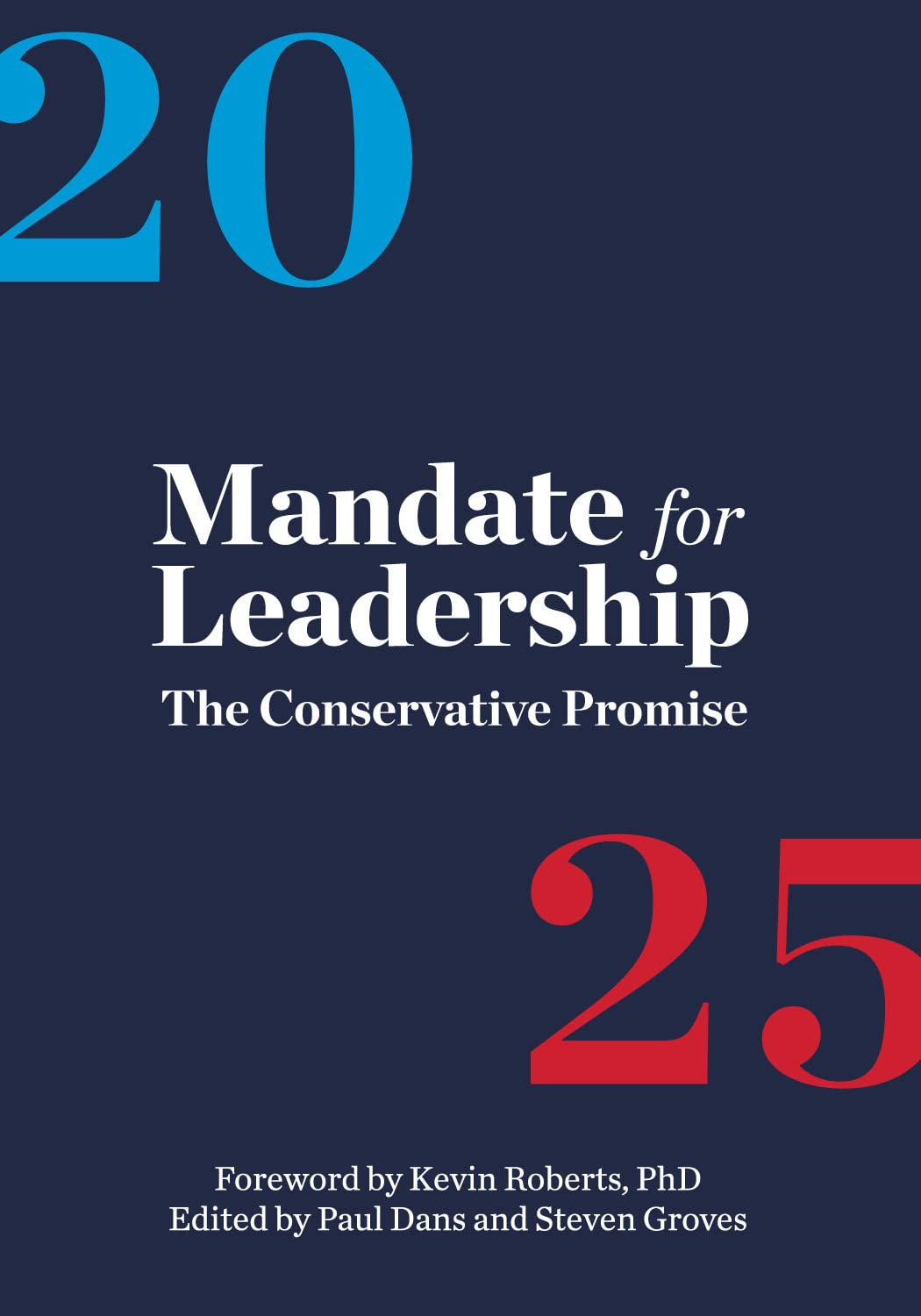





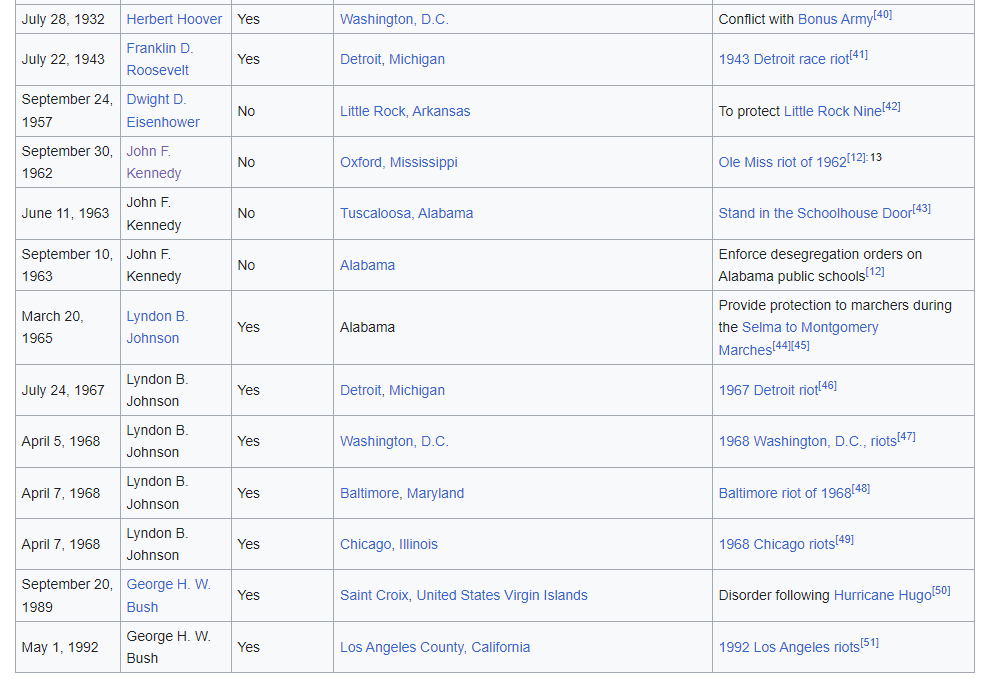


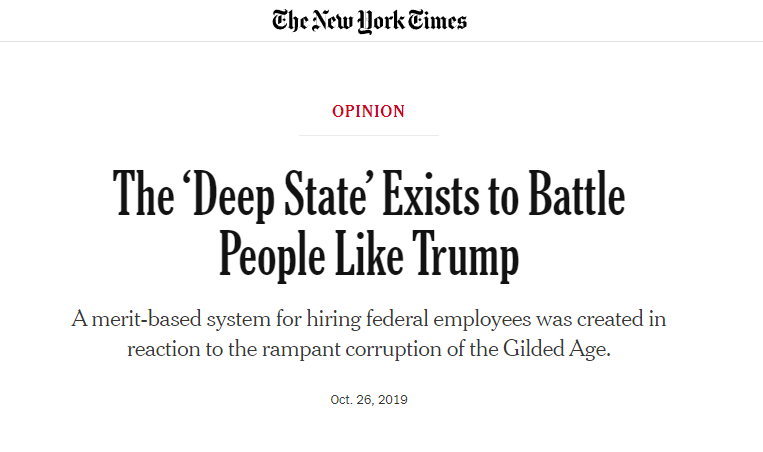

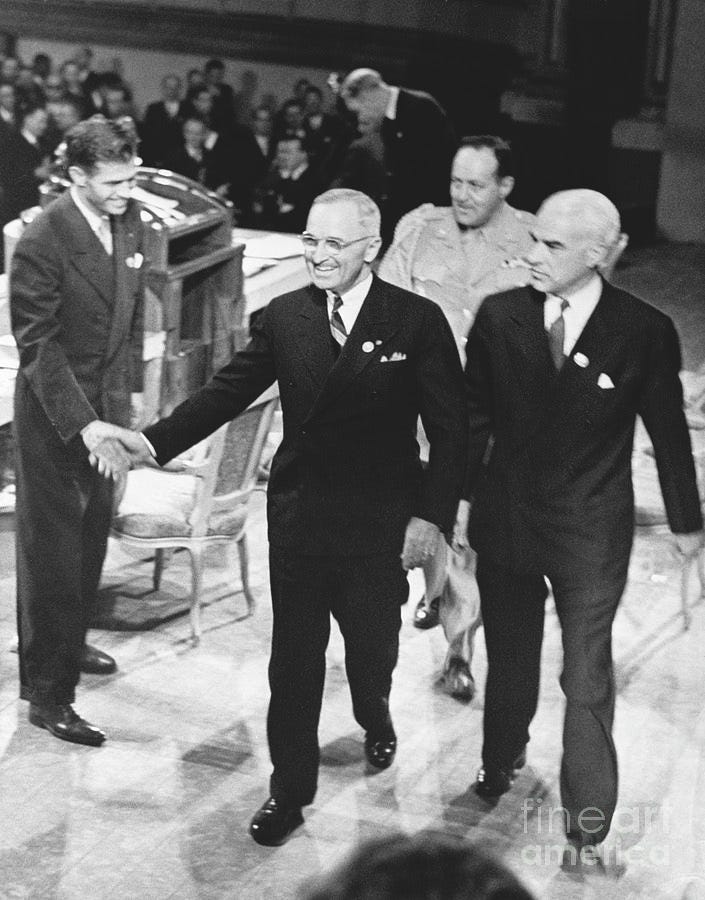
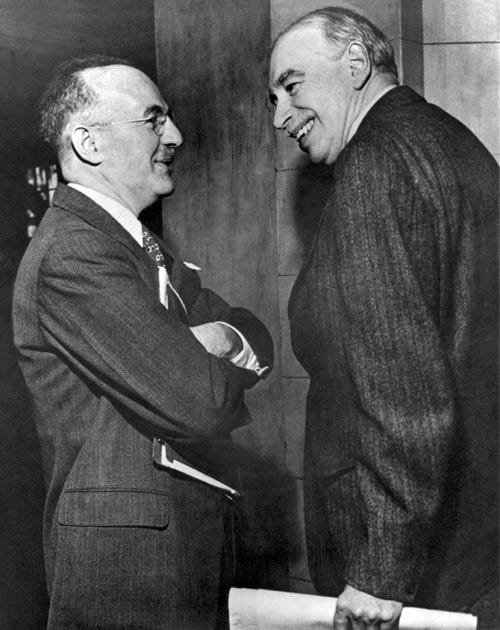



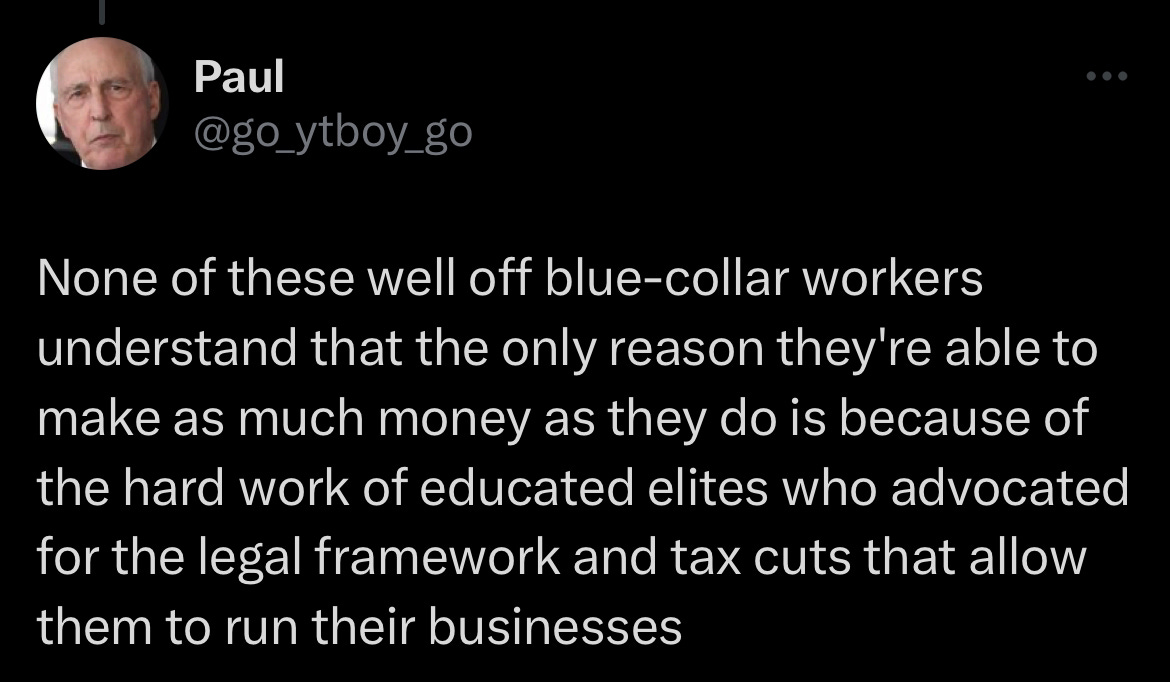

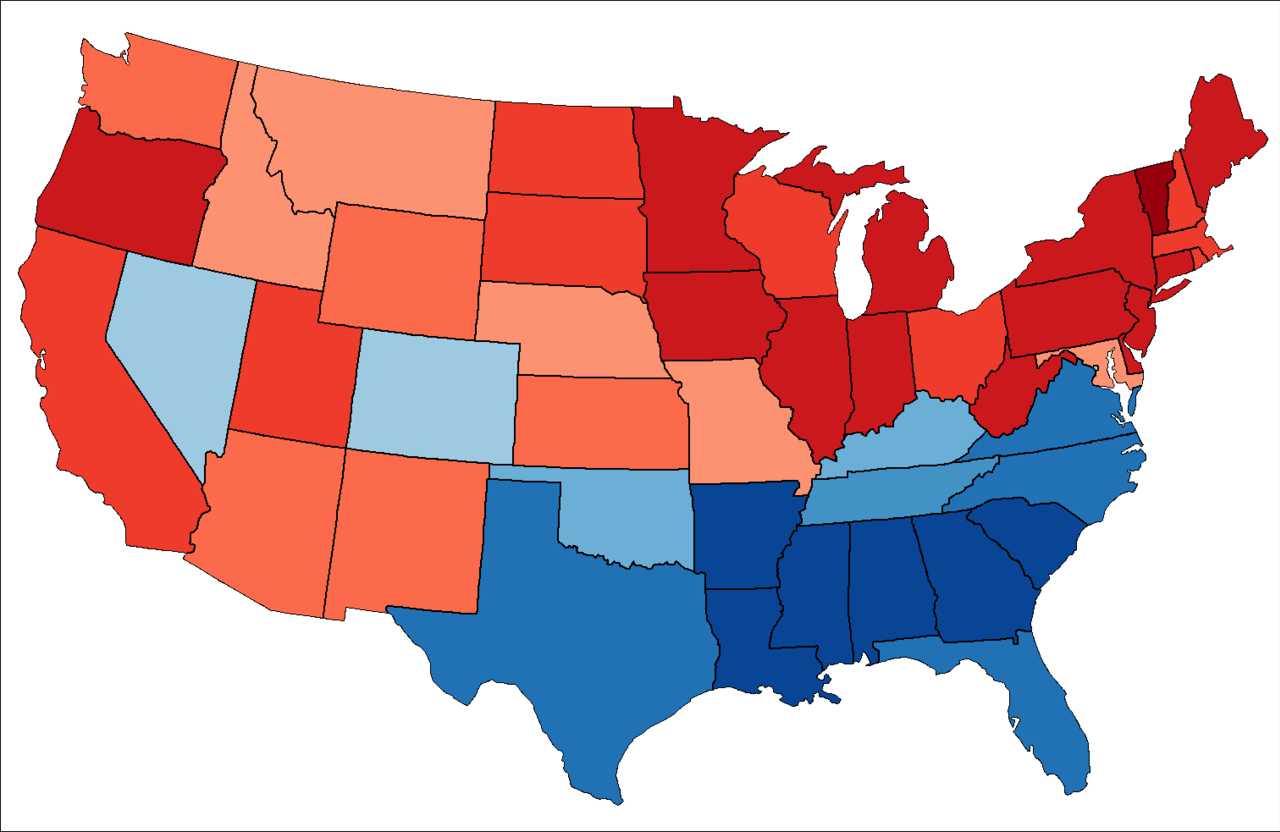
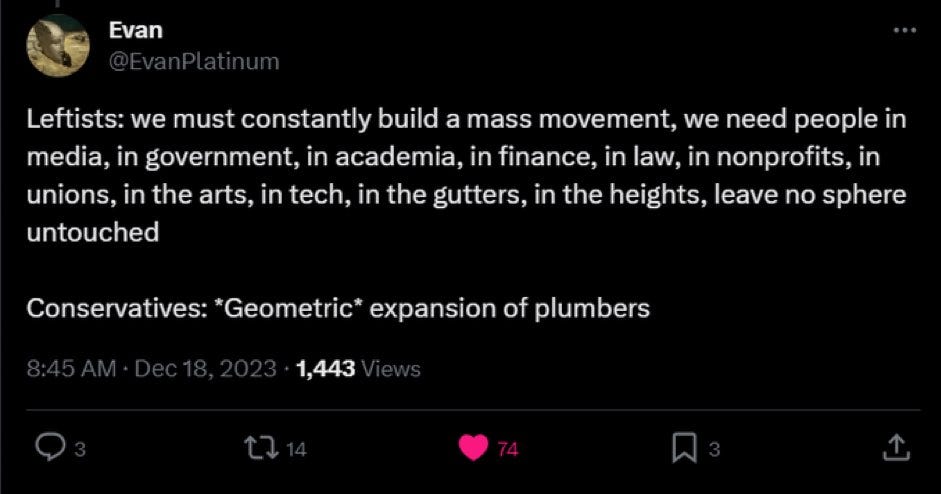
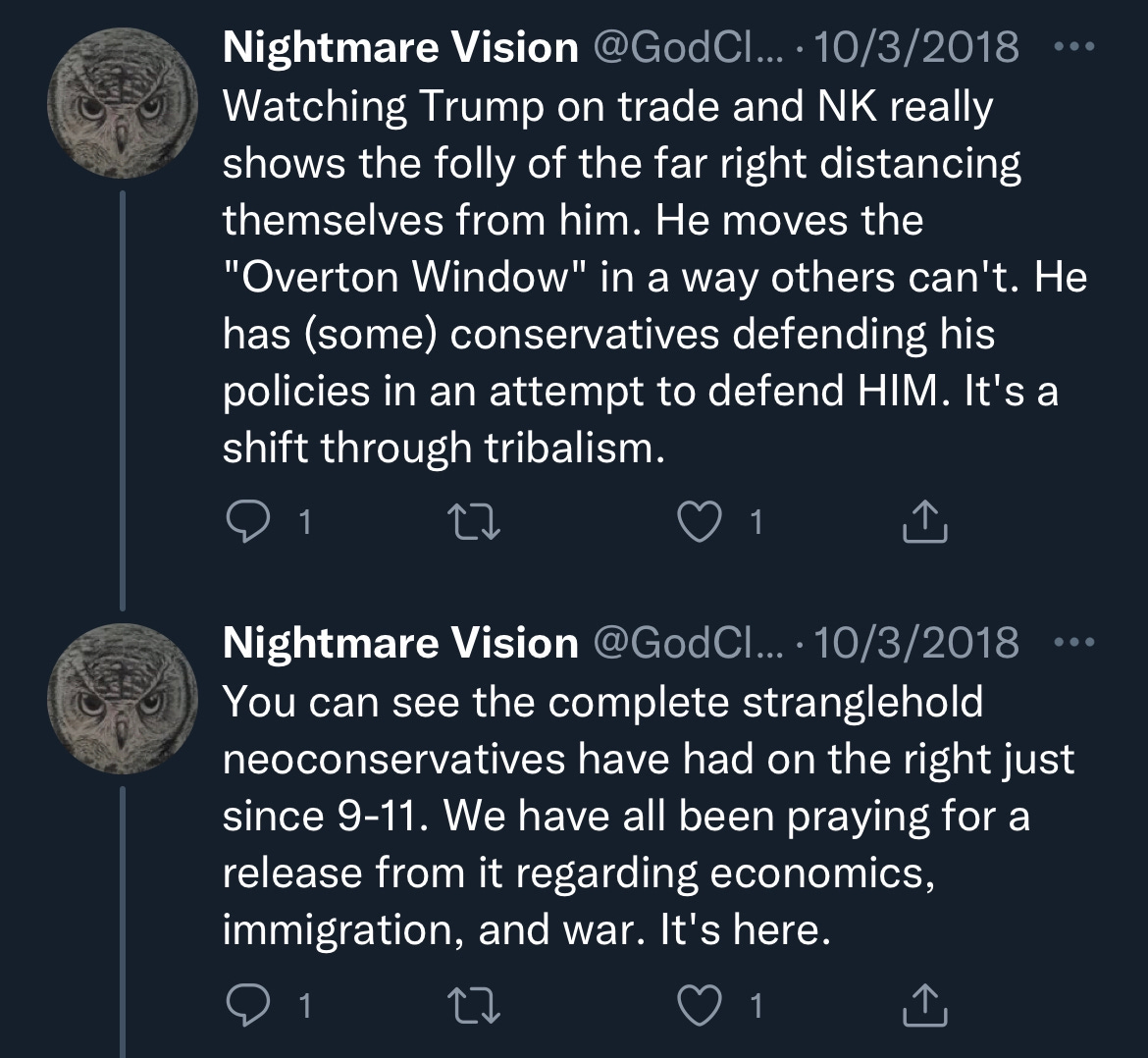
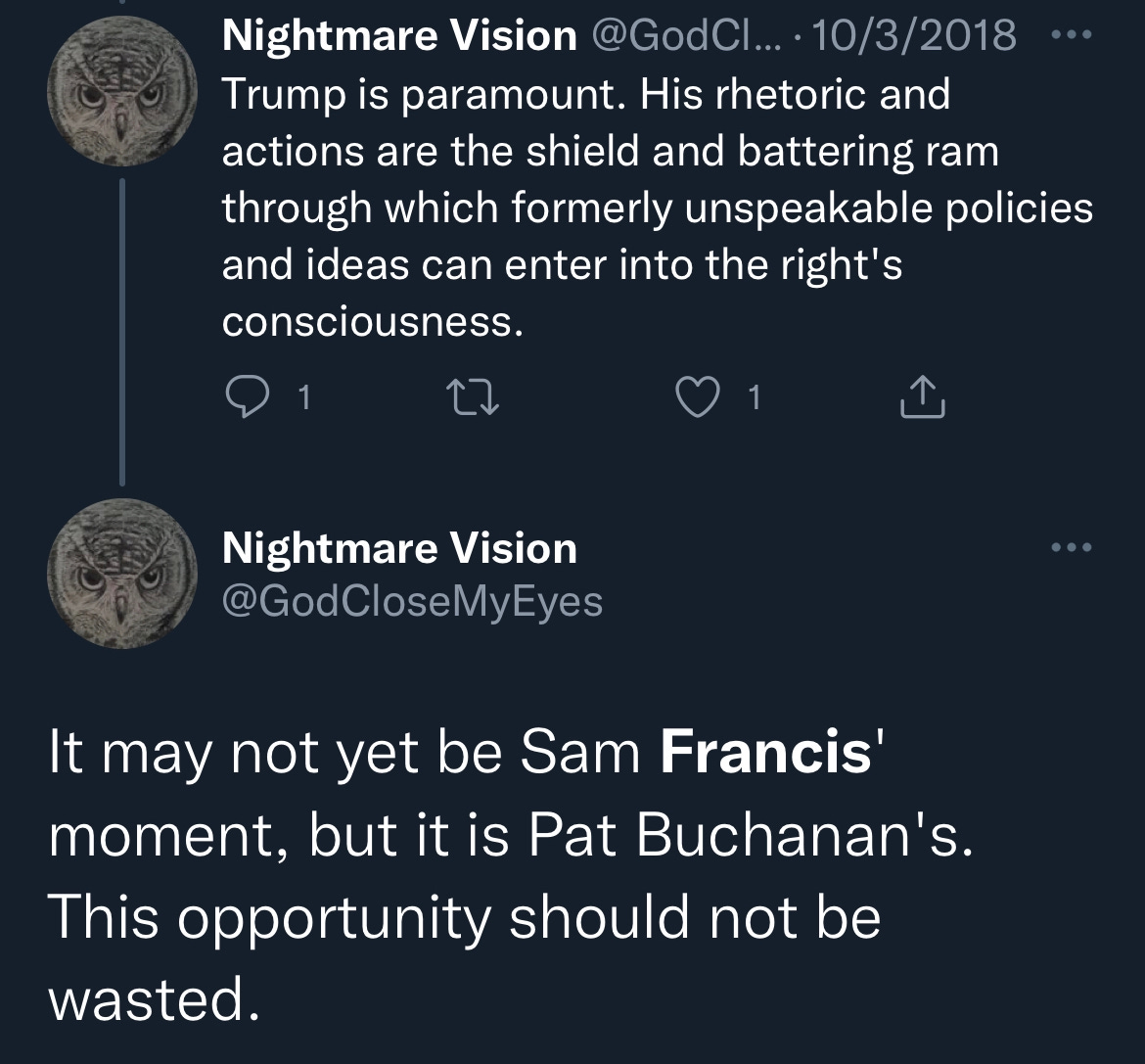

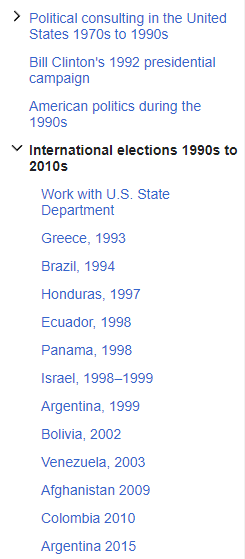
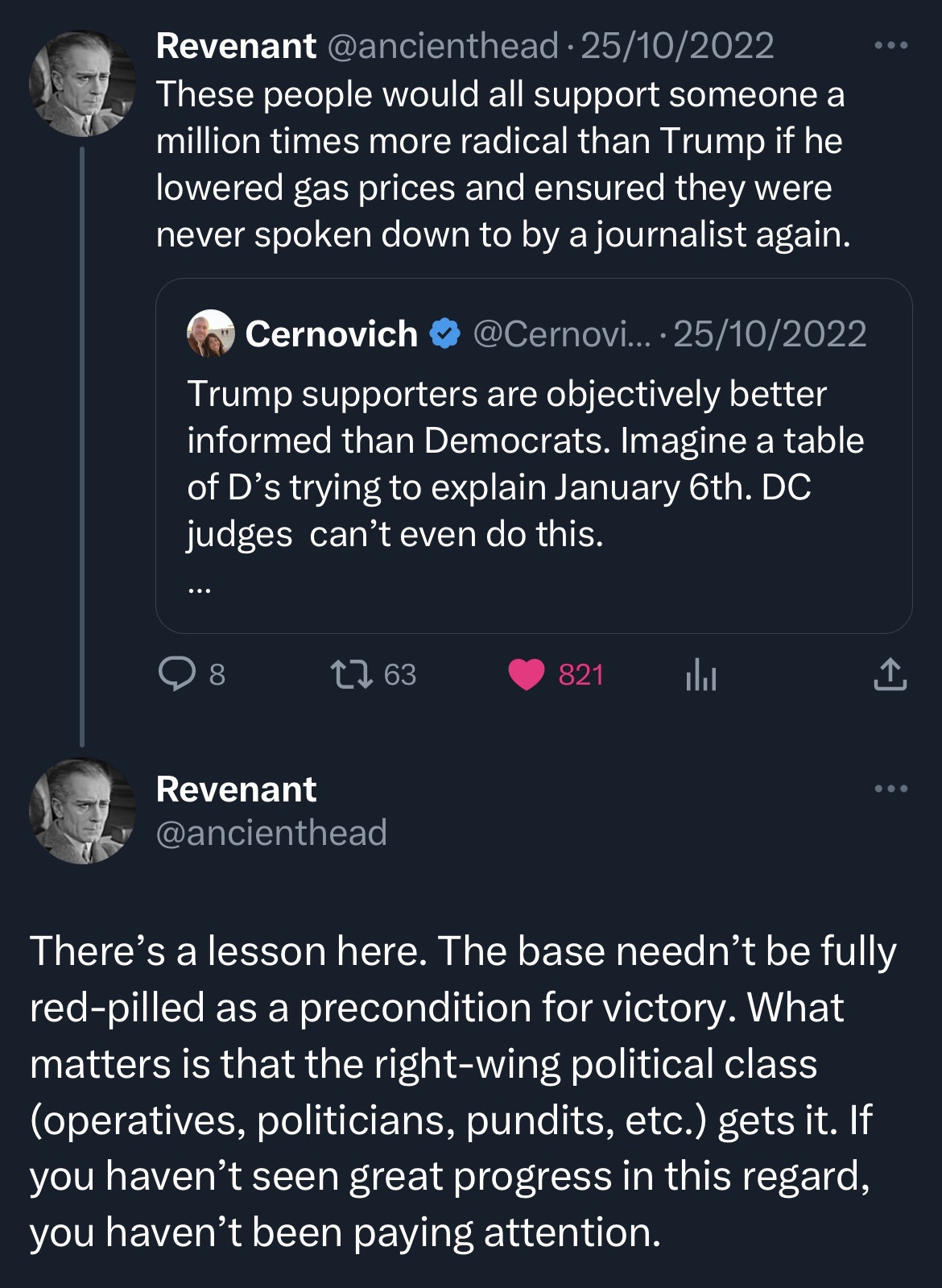
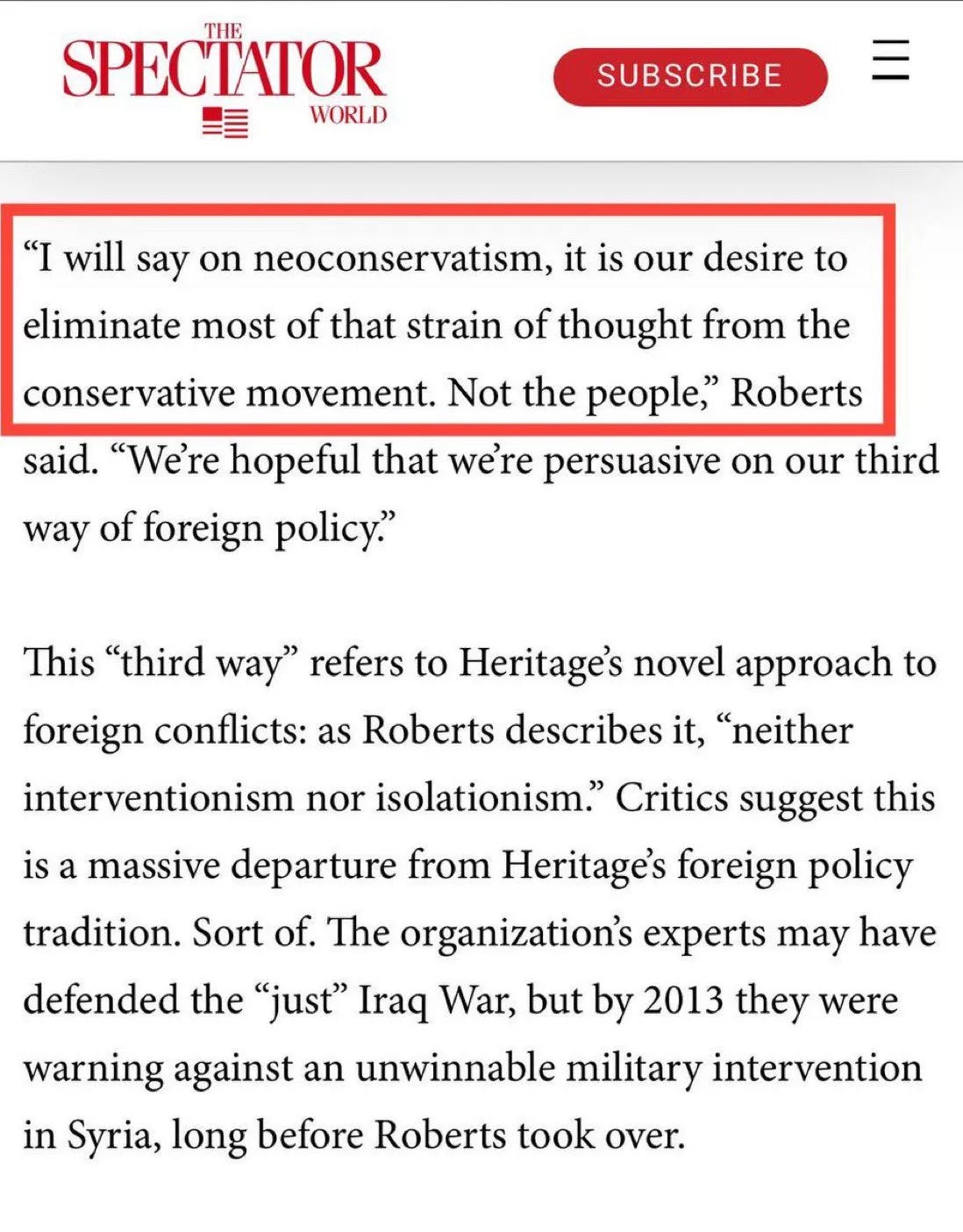



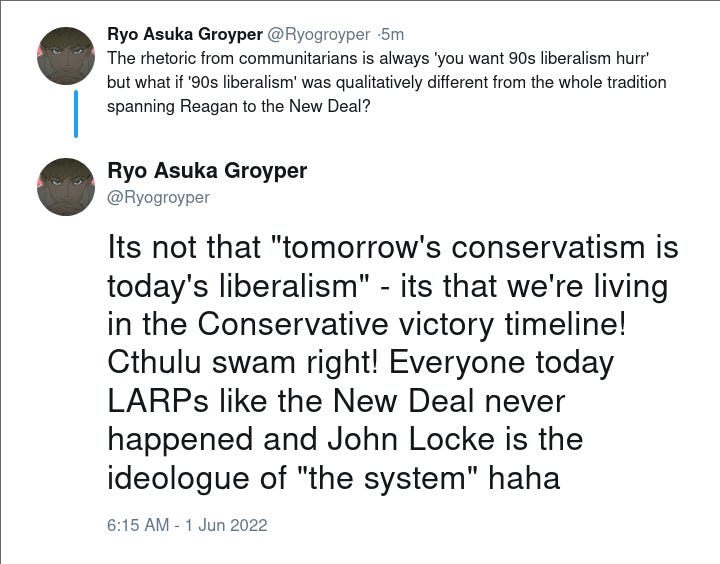


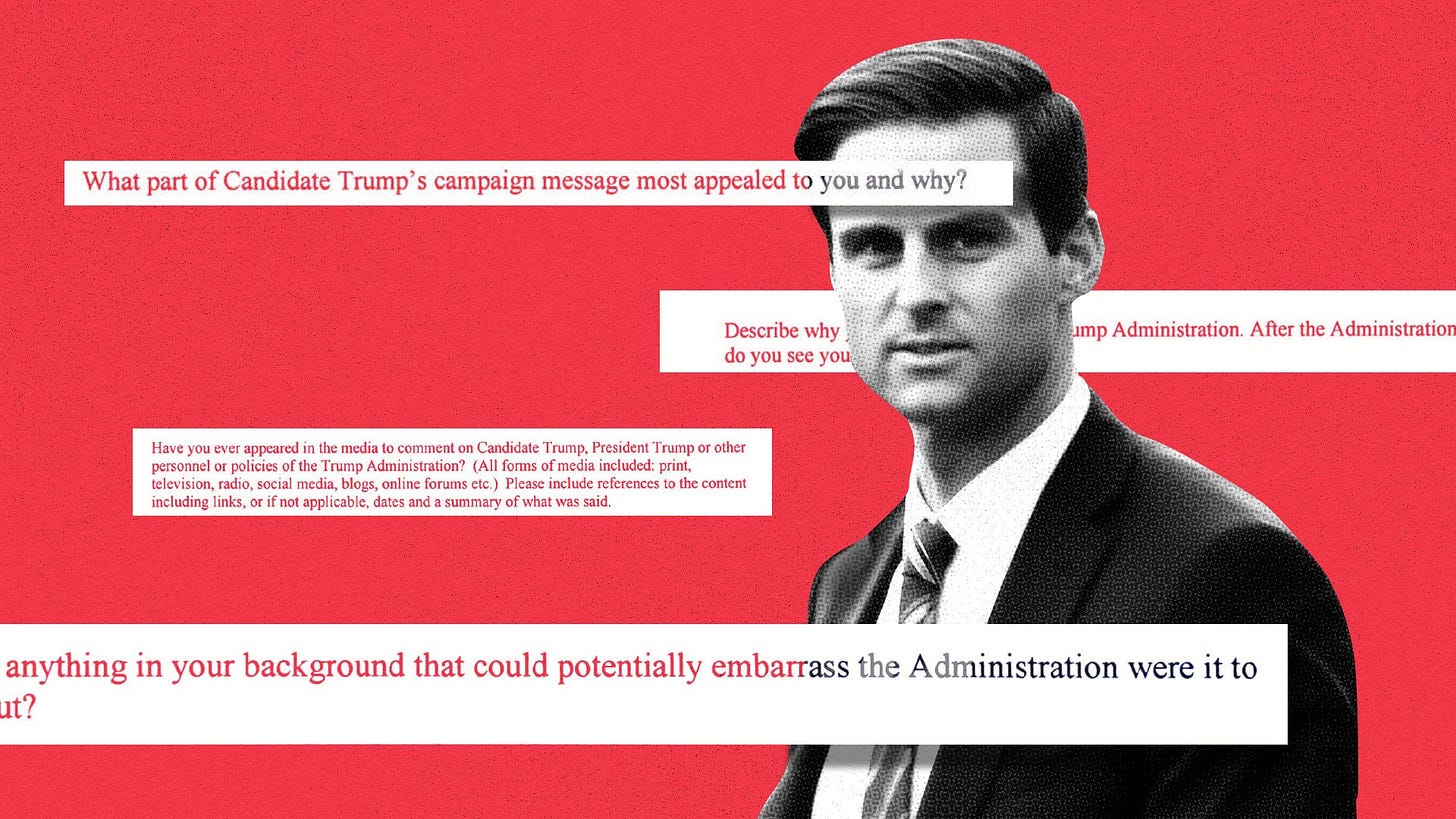

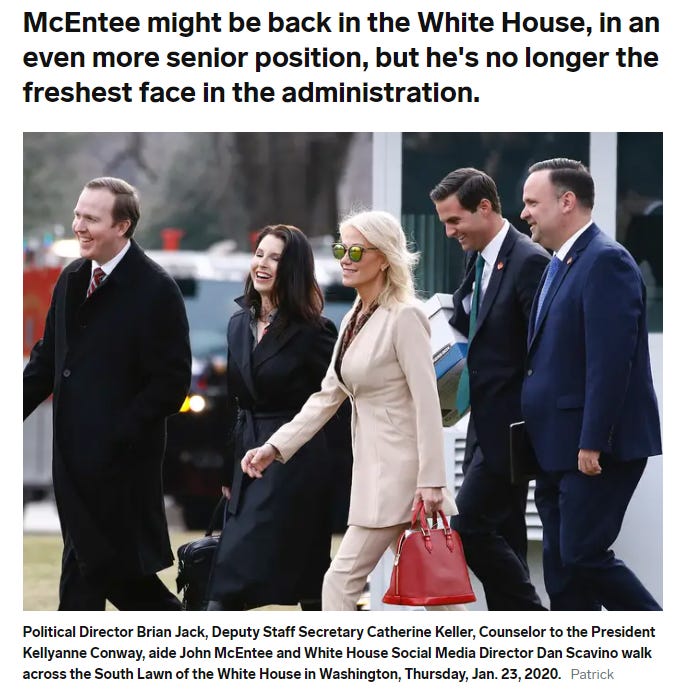







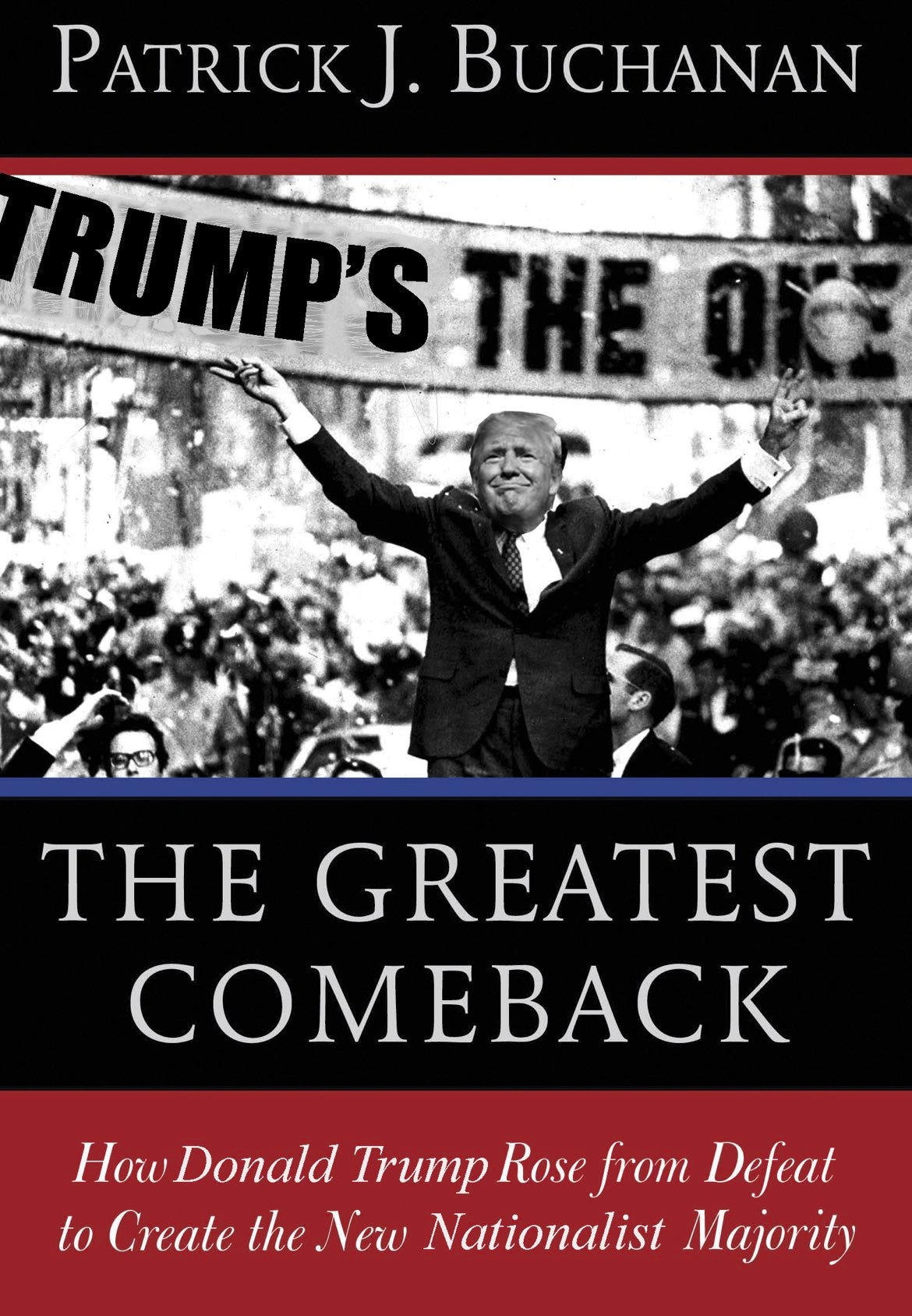


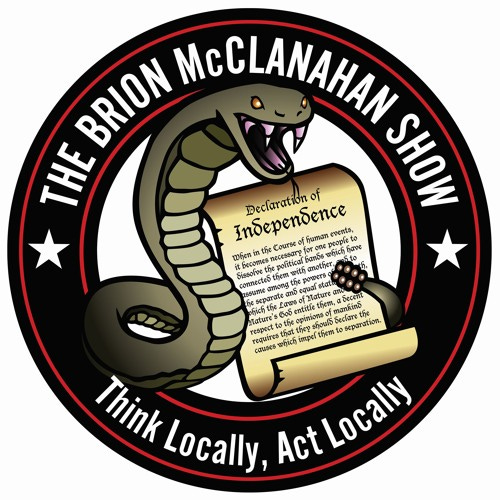


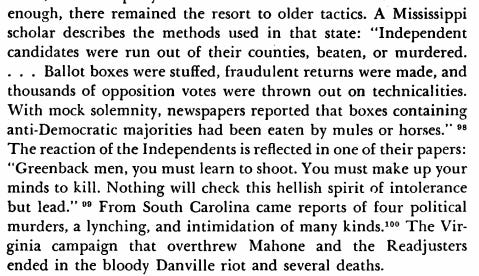
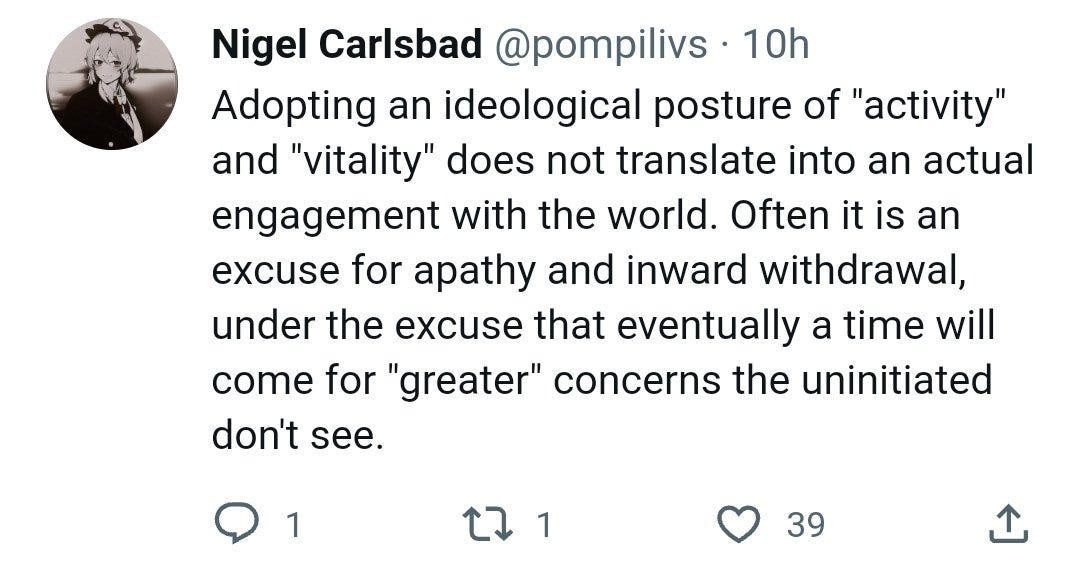









The shift in Trump's rhetoric is an excellent and encouraging observation.
There are some good ideas here, but also some common bad ones, that I see a lot in this sphere:
- The 'elite theory' thing pushed recently by a bunch of big Twitter accounts never really gets argued out. The current elite is rotted through, and the regime has made it clear that it will not make the 'mistake' of allowing competent people into power anywhere. The Ivies will take "Jazz" Jennings, but not some random White kid with good grades, even if he has no dangerous political indicators. The generals are incompetent and uncharismatic because to be otherwise would make them a coup risk. There is no assembly of useful elites in the halls of power that just need a big twitter account to generously accept a role as their eminence grise in exchange for a lifetime sinecure for him and his friends.
- The idea that institutions need to be filled by right wing bureaucrats has long been recited by National Review writers - "We need to build a bench!". But that's wrong, righties have never built a bench, and we've been in power plenty of times. That role doesn't appeal to right-wingers, and fundamentally transforming the American right winger such that new middle schoolers discovering /pol/ will start considering a D.C. career pipeline would take long enough to be a meaningless endeavor, even if it were possible. If the positions need to be filled, they can be filled the same way early American presidents filled cabinet positions - with trusted friends and allies who have no real qualifications. If we don't have a 'bench' for a given obscure department, a savvy right-wing president can randomly sample his primary campaign volunteers. This is covered well in the second half of the article, the conflict should be ironed out somehow. Capable young right-wingers are rarely motivated by long magazine articles, frequently motivated by funny greentexts, and every effective RW action has been built from the bottom up rather than the top down - rightie grunts are intelligent enough to organize themselves, so long as the forces sabotaging this are mitigated.
- The idea that local power is useless because of legal precedents is incoherent, as far as I can tell. It doesn't really get justified at all. Of course, you can argue the legality of a county or state going farther than the feds on immigration, but the law, as has become undeniably clear over the past eight years, is just a piece of paper. The only thing that controls whether you can do something is whether someone else is willing to stop you, and I don't think anyone who exclusively plays by the rules can win in current year. Even the Left, whose 'long march' took place against the kind of enemy that would actually allow one, used violence, corruption, and blatant cheating at every opportunity, counting on the fact that they'd be able to avoid or survive any consequences that their enemies might impose. The reason that Red State governorships are the most heavily-policed positions in the nation is that, if even one of them were to go to someone genuinely good, it could be the end of the leftist project in America. When it comes down to it, the regime does not have the cojones to stop a Rubicon-crosser in an executive position.
- Greer and Mystery Grove are mentioned by name here, so I should take the opportunity to make a controversial statement. They are both heavily-promoted, they know who to flatter in The Groupchat, but I don't think any capable people actually like them - they recommend the opposite of what Ricky Vaughn, the only *good* right-wing online organizer of our time - actually did. Anyone that spends every waking moment disparaging their political base is either stupid or malicious - stupid because they're revealing themselves as unserious about actually taking power if they insult or marginalize their side's "grunts", and malicious because a large account that does nothing but viciously, loudly attempt to quash any hint of comradery, shared mythos, or hope in the room is very obviously a burden rather than an asset. Moreover, I find it a bit odd that Greer's appearance on Twitter coincided with a near-weekly specially-written Twitter trend outlining his latest argument in the sidebar. The people running the censorship apparatus understood long before that point that doing that just makes whoever's being targeted more popular and more influential, and the way to get rid of *effective* opponents is to ban them from social media and never talk about them again. A lot of people popped up around the same time he did, with around the same attitude towards the political base that Ricky so effectively engaged with, and the same degree of uncharacteristic 'I can't believe it's not promotion' from the media apparatus. I'm not generally conspiratorial, but something feels very off about these people. Especially given Mystery Grove's earlier "I'm leaving and anyone who comes back under my name definitely isn't me!" meltdown.
Emblematic of all of this is the presence of a lot of twitter screencaps by middle-aged guys who spend a lot of time in groupchats, but no 4chan caps from the edgy teenagers and wild-eyed neets who, for all their strangeness, were culturally competent. In 2016, it was the opposite - anyone with a username understood that his role was to be a cheerleader for the anons (a lot of people use that term wrong now) who do the actual thinking. I don't like to sound harsh, and I'm largely attacking the trend in rhetoric from big accounts that have exploded in self-importance rather than this article in particular, which is a lot more grounded than those accounts - any successful strategy must acknowledge that ordinary righties are much more suited to being the 'elite' than anyone actively making a play for that position; that the elite cannot be co-opted or populated with our own cadre of underemployed PhDs, but must be removed so that a new one can rise naturally in its place.
That said, this article does a good job of pointing out that Trump did a lot of what people asked of him. He was and is by far the best we're going to get. His pivot from "the people running the show are idiots, but they'll understand once I start fixing things that this is in everyone's interest" to "the people running the show are evil, and need to be expunged from the halls of power" is meaningful - there will be no peace offering this time. It's always good to highlight recent bouts of competence and effectiveness from our side, and far too few people are doing this. A few random people looking around the country for local and state-level officials who are doing something right, spreading it out around our corners of the internet, making it accessible, could do a lot.
One thing that's of exceptional interest is how all of this plays out in the context of election fraud. The idea that his current team is better than ever sounds reasonable - much of the establishment presence slithered over to DeSantis when they considered it plausible that they might be able to replace Trump, and I doubt they'll be allowed back in. Still, as far as I can tell, the only path to success in the face of a fraudulent election was to simply refuse to leave, and cross the Rubicon (as so many have put it). The "most conservative in history" Supreme Court has made it clear that only two members have anything but contempt for the American people and their lone representative, and I do not believe the narrative some have offered that tweaking the parameters of Trump's legal argument would have meaningfully changed the outcome of that. Without incumbency, and the legitimacy that entails, a rubicon-crossing is a lot harder to pull off, especially now that every martial institution has been thoroughly purged of both the patriotic and the competent.